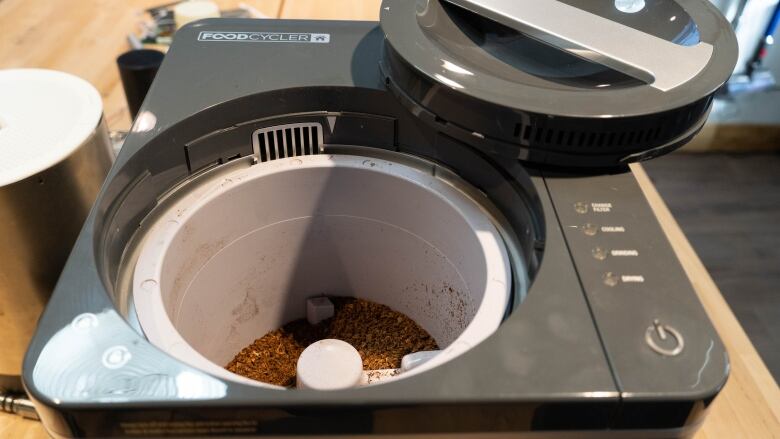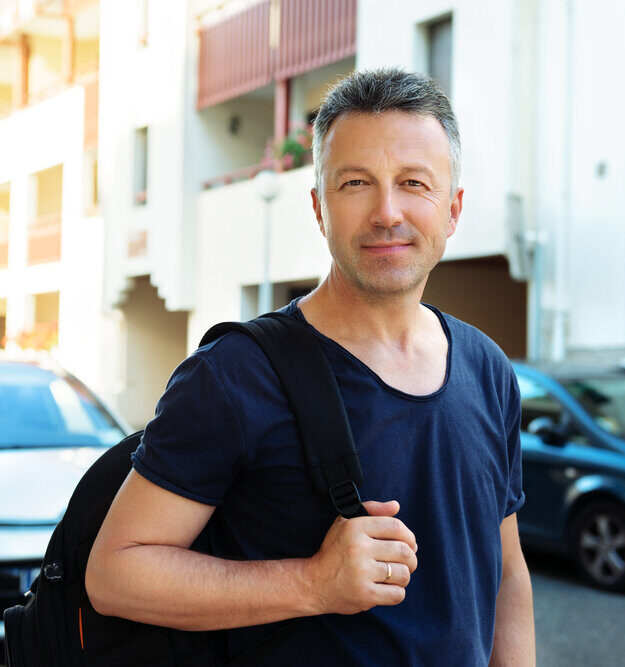An Ottawa-based company is trying to change the way households across the country dispose of food waste with innovative technology that speeds the composting process to hours.
Food Cycle Science has hired about 20 municipalities across Canada to pilot its FoodCycler, a small food waste recycling machine that the company says can reduce the weight and volume of food waste by 90%.
CEO Bradley Crepeau says the company is trying to help communities that don’t have easy access to some of the more traditional organic programs, such as the curbside collection available in more densely populated cities.
“We are currently working with remote, rural and Indigenous communities, but we are really aiming to ensure that this is a solution, or at least part of the solution, for any municipality and community across Canada,” said Crepeau. .
Each FoodCycler unit can easily fit on a kitchen counter and is equipped with a 2.5 liter bucket for food waste.
Through a drying, crushing and cooling process, the FoodCycler aerates food waste without producing methane gas and turns it into compost in four to eight hours.
“The sad reality is that food waste is very harmful to the environment. It is one of the biggest emitters of greenhouse gases,” said Mr. Crepeau.
When food thrown in the trash reaches the landfill and begins to decompose, it releases methane, a gas that is valued be about 25 times more potent than carbon dioxide over a 100-year period.
“The company’s vision is to try to change the way people think about and deal with food waste,” said Crepeau.
Discharges reaching capacity
The Township of South Glengarry, southeast of Ottawa, just completed a 12-week pilot project with Food Cycle Science where 100 residents purchased a FoodCycler for their home at a subsidized rate.
Township executive director Tim Mills said local authorities have been looking for ways to divert food waste from local landfills, one of which is already at full capacity and two more will be full in five and 13 years, respectively.
“It’s millions of dollars to expand landfills or to start a new one, or to shut down and open a new one,” Mills said. “We need to look at other options, and that’s just a small piece of the puzzle.”
During the pilot, residents were asked to track their usage to determine the amount of waste diverted. Mills said the township is still analyzing all the data received, but residents overall seemed happy with the outcome.
Alex Hayman, who leads the municipal solutions team at Food Cycle Science, describes the completed pilots as successful.

“Everyone in a small town has the same problem, which is a lot of garbage and little landfill space remaining and we are offering them a solution,” he said.
Hayman said many small communities do not have access to nearby organics processing facilities to transport compost to the curb, so they either have to haul the material a long distance or waste the waste. food ends up going straight to landfills.
“If we can start tackling this food waste at the source, we are not only limiting methane emissions from food waste, but [also limiting] transportation emissions due to the decrease in the number of trucks on the road, ”said Hayman.
Community expansion program in British Columbia
Across the country, Nelson, B.C. city council recently approved a plan to have every household in the city equipped with a home organics pre-treatment unit, as a result of ‘a successful pilot project.
Nelson has approximately 5,500 households and was the first municipality in Canada to participate in the FoodCycler pilot project, said Cecilia Jaques, climate and energy advisor at the city of Nelson.

Jaques said that because the community is rural bears are of great concern to residents who compost in a more traditional way, and this project limits that problem.
“One of the reasons this organic waste diversion model is so attractive to our residents is that the soil amendment that comes out of the pretreatment process is actually sterile and odorless, so it doesn’t attract pests and fauna, ”Jaques mentioned.
She said the city would follow municipal procurement guidelines before deciding which pre-treatment unit to offer residents, but the municipality was “incredibly pleased” with the results of the pilot.
“I think there are a multitude of benefits that make this program a great program for rural communities,” Jaques said.

“Amateur web enthusiast. Award-winning creator. Extreme music expert. Wannabe analyst. Organizer. Hipster-friendly tv scholar. Twitter guru.”
